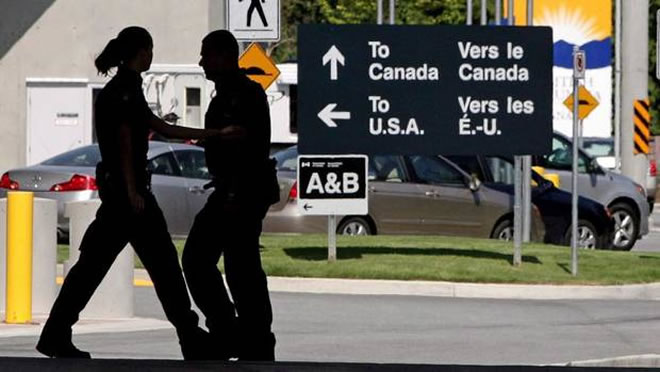
Canadian border guards replace each other at an inspection booth at the Douglas border crossing on the Canada-U.S. border in Surrey, B.C. (DARRYL DYCK /THE CANADIAN PRESS)

Friday, January 04, 2013
Almost all applicants seeking a visa to enter Canada will have their identity checked against American immigration databases to see whether they have been previously blacklisted, under a bilateral treaty signed with little fanfare last month.
And in a separate measure, Canada will be fingerprinting visa applicants from about 30 countries, including Colombia, Haiti, the Palestinian territories, Yemen and Iran by the end of this year.
The measures are part of a sweeping effort to keep out the unwanted and dangerous, while simultaneously easing movement across the common border. The new rules will affect millions – an estimated 2.2 million people seek visas to enter Canada every year.
Cross-checking visa applicants’ identities against U.S. immigration databases will begin immediately. The U.S. will do the same withCanadian immigration databases.
Once fingerprints are being taken later this year, they will automatically and electronically be checked against U.S. immigration databases as well as Canadian police records – a move rights groups worry will infringe on privacy, is open to abuse, cannot be effectively challenged and will lead to far greater exchanges of information.
Citizenship and Immigration Minister Jason Kenney hailed the Immigration Information Sharing Treaty as “building on our countries’ mutual efforts to protect our common borders and surrounding perimeter through improved screening.” It would, Mr. Kenney claimed when he signed the treaty, “prevent terrorists, violent criminals and others who pose a risk from entering Canada and the United States.”
However, a person on a terrorist watch list might not show up on an immigration database. Terrorists and violent criminals will trigger an alert only if they had previously been denied a visa or been deported for overstaying or other violations. The treaty allows visa officers of both countries to electronically check the other country’s immigration database only.
Although Canadian police and security agencies exchange information with the Central Intelligence Agency and the Federal Bureau of Investigation in the United States, the new treaty doesn’t provide for – or allow – interrogation of those agencies’ far more extensive blacklists as part of the new information-sharing process for visa issuance.
Still, the scope of the new system is huge. Visa applicants range from students to those seeking work, to infants adopted overseas by Canadian citizens, to relatives seeking to visit and prospective spouses wanting to move to Canada. Every one of those applications – save those from citizens or permanent lawful residents of the United States – will now be checked by Canadian visa officers against U.S. immigration databases.
So, for instance, the foreign fiancé of a Canadian citizen seeking a visa to become a landed immigrant would have his details (and soon a fingerprint) checked against the U.S. system.
Any derogatory information, ranging from overstaying a student visa to being deported for a serious crime, would be made known.
Although both countries retain the right to admit (or reject) a visa application irrespective of the files kept by the other country, the purpose of the information exchange is to alert Canadian and U.S. officials to negative records kept by the other country.
“Our ability to screen out people who abuse our respective immigration programs will be significantly strengthened,” Mr. Kenney said.
But applicants will never know why they were rejected nor whether that decision was based on information obtained from bilateral sharing of information of each country’s blacklists.
The system lacks “any due process,” says Nathalie Des Rosiers, general counsel of the Canadian Civil Liberties Association. Canadians may find they “cannot have family reunions, cannot invite a fellow scientist, a guest or a foreign student” because a visa application was rejected “based on information that may or may not be correct” in the U.S. system.
Ms. Des Rosiers said the fundamental problem with the grand plan for a security perimeter is the absence of “strict transparency rules as to what [rejected applicants] can to do to challenge the U.S. assessment.”
Under the treaty, no information is to be shared about U.S. or Canadian citizens or lawful residents of either country, although existing channels between security and police agencies on both sides of the border routinely exchange information.
In the United States, fingerprinting of visa applicants and other visitors is already routine. In Canada, the collection of biometrics will be phased in starting later this year. Citizens from Afghanistan, Albania, Algeria, Bangladesh, Cambodia, Colombia, the Democratic Republic of Congo, Egypt, Eritrea, Haiti, Iran, Iraq, Jamaica, Jordan, Laos, Lebanon, Libya, Myanmar, Nigeria, Pakistan, the Palestinian territories, Saudi Arabia, Somalia, Sri Lanka, Sudan, South Sudan, Syria, Tunisia, Vietnam, and Yemen will be the first to be fingerprinted. At least initially, children under 14 and adults over 79 seeking Canadian visas will be exempt from fingerprinting, but their details will still be checked against U.S. immigration databases.